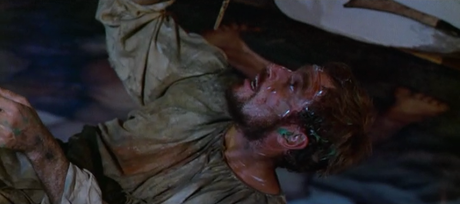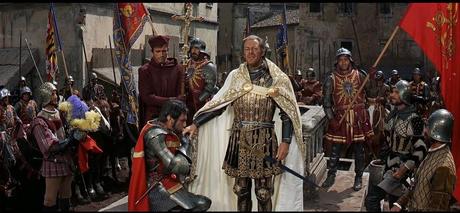 The Agony of the Ecstasy (1965) is curiously frustrating. Drawing on Irving Stone's novel, Carol Reed excels in showing the battle of wills between Michelangelo and his patron, Pope Julius II. Too bad the filmmakers blow Agony's story out of proportion, undercutting much of its drama.
The Agony of the Ecstasy (1965) is curiously frustrating. Drawing on Irving Stone's novel, Carol Reed excels in showing the battle of wills between Michelangelo and his patron, Pope Julius II. Too bad the filmmakers blow Agony's story out of proportion, undercutting much of its drama.Michelangelo Buonarroti (Charlton Heston) works as a sculptor in Renaissance Florence. He's commissioned by Pope Julius II (Rex Harrison) to paint Rome's Sistine Chapel. But Michelangelo clashes with Julius's vision; the artist flees into exile, where an immaculate vision convinces him to return. Michelangelo works obsessively on his fresco, not allowing his health, Julius's criticism or the invading League of Cambrai to interrupt his work.
Reed and screenwriter Philip Dunne boil Stone's dense novel into a colossal clash of wills. Michelangelo starts self-absorbed and mercenary; he ponders a profitable commission from the Turks while arguing with the Pope. Julius talks about restoring faith, yet he's clearly establishing a temporal Empire. This "warrior pope" is introduced in battle garb, with an aide hastily providing his robes! Both find mutual solace in the Chapel fresco; Michelangelo in finding a worthy project, Julius in its lasting expression of Christian values.
Agony equates religious fervor with artistic devotion: Michelangelo sacrifices his private life to craft his masterpiece, just as Julius uses immense resources to rebuild Rome. Watching an artist paint might be boring, but Reed astutely shows its personal toll. Michelangelo loses his lovers and his health deteriorates, driven by single-minded obsession. It takes years of work yet is his achievement worthwhile? One can endlessly debate art's value, but Agony's answer is clear-cut: Michelangelo's fresco outlasted Julius's empire by five centuries.
 Charlton Heston does excellent work, channeling his sturdy righteousness into art rather than action. Rex Harrison relishes his pontifical villain, all velvet deviousness and officious preening. Diane Cilento (Hombre) plays Michelangelo's abortive love interest; Harry Andrews (The Charge of the Light Brigade) and Adolfo Celi are Julius's shifty supplicants. There's a bit part for Tomas Milan, future Spaghetti Western star, as Raphael.
Charlton Heston does excellent work, channeling his sturdy righteousness into art rather than action. Rex Harrison relishes his pontifical villain, all velvet deviousness and officious preening. Diane Cilento (Hombre) plays Michelangelo's abortive love interest; Harry Andrews (The Charge of the Light Brigade) and Adolfo Celi are Julius's shifty supplicants. There's a bit part for Tomas Milan, future Spaghetti Western star, as Raphael.It's unfortunate that Reed inflates Agony into an artificial epic. It's not merely Leon Shamroy's sumptuous photography and the exquisite sets but obvious efforts to increase the length. There's a fifteen minute (!) biographical prologue which is less expository than graceless padding. Reed adds several battle scenes for salable trailer moments. There's even an intermission, with Agony wheezing towards a still-modest 138 minute run time.
The best epics balance character drama and outsized spectacle. But Agony's efforts to expand outside the Sistine Chapel feel painfully forced. There's no reason for a tedious mini-docu in a fictionalized biopic, while Julius's military campaigns are so thinly sketched their inclusion feels superfluous. It's like Agony doesn't trust its audience to engage with its story (given the film's failure, perhaps justifiably). It's an unfortunate mixture, too large for an intimate drama yet too small for an epic.
Carol Reed's later work (even the Oscar-winning Oliver!) never garnered the critical respect accorded to his earlier pictures. The Agony and the Ecstasy shows him straining under studio diktats to make a cerebral story crowd-pleasing. The result isn't as effective as it should (or could) be.

